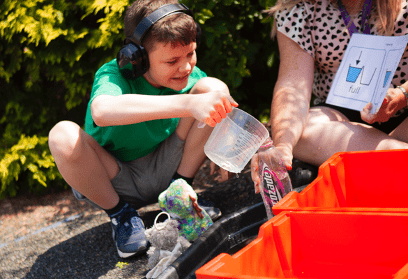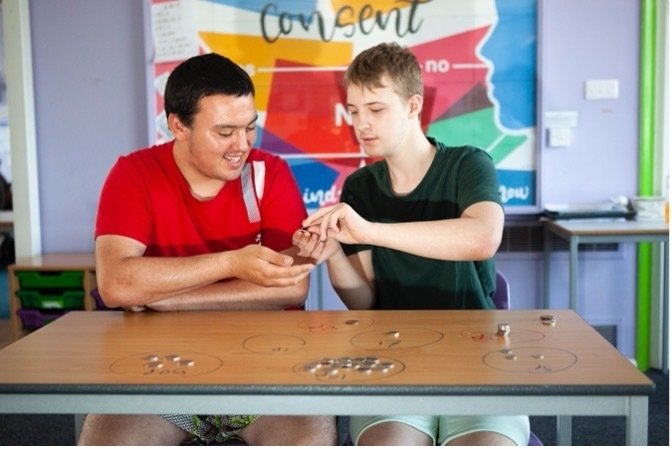Maths
Maths and numeracy form an integral part of our everyday curriculum at Mill Ford. We endeavour to provide opportunities that allow the learners to practice and embed their skills and knowledge in a variety of practical and functional context and situations. Such an approach enables the learners to apply their skills and knowledge in a relevant and purposeful manner, appropriate to their model of learning.
The maths curriculum provides a breadth of opportunities for the learners
The teaching of maths always starts from a practical basis and when the pupils are ready, taking their learning to a pictorial level and then abstract level. When teaching new concepts, pupils will return to a practical approach in order to establish the new concept.
It is vital that the language associated with maths and numeracy is taught alongside new concepts and skills.
EYFS / KS1
All pupils are introduced to mathematical concepts associated with Early Learning Goals. This is facilitated through the use of
- Songs
- Action rhymes
- Games- providing opportunities to talk about maths and reinforce learning in a fun way; this can also provide opportunities to develop problem solving skills
- Practical everyday situations -such as knowing where to put their coat and understanding positional language eg put the toys in the box when tidying up
- Independent exploration of resources linked to numeracy and maths – developing a questioning approach towards a situation and developing problem solving skills
- Noticing changes and exploring cause and effect activities and toys – leading to anticipation and prediction skills
- Developing an understanding of routines and the passage of time through the use of timetables
- Organising and categorising objects – providing opportunities to sort and recognise similarities and differences
- Creating patterns with a range of materials / equipment
- Musical games and songs
- TAC PAC
- Intensive interaction
- Multi sensory stories / activities
KS2
At the end of KS1, an assessment is made as to which style of learning is most appropriate for the students.
Informal learners will develop their maths and numeracy skills through a more cross curricular approach. The teaching will continue to involve all elements of the maths curriculum however. The strategies used will continue as above, developing their leaning through a more sensory approach.
Semi-formal learners will start to be taught their maths and numeracy as more discrete lessons, although there will always be opportunities for skills to be reinforced at all times including at snack, playtimes and dinner times. Where possible, the activities will be based around the theme for the term. The approach towards the teaching of maths will continue to utilise the above activities in a practical manner , however, it is hoped that pupils will start to build on from practical activities onto pictorial and abstract recording at a simple level for concepts, skills and knowledge that are consolidated at a practical level.
The Scheme of Work indicates which strands of shape, space, measure and statistics is going to be taught alongside number.
The maths curriculum is available to support progression of skills, concepts and knowledge. Alongside this, the Scheme of Work from White Rose is available. The school calculation protocol gives support re the development and approach to teaching calculation skills.
Formal learners have discrete maths and numeracy lessons, following the Scheme of Work and there will be an introduction to a greater range of manipulatives, for example, Numicon or Dienes. The length of time spent on each concept or skill, will be highlighted within the MT plans which will be personalised for each individual.
Progress is tracked and monitored at the end of each term on the maths tracker.
KS3
For informal learners, maths and numeracy will continue to be taught through a practical and functional approach, identifying those skills and concepts that are likely to be most important for individuals working within this mode of learning. These will be identified on an individual basis and identified within the MT plans. Consideration will be given to the age of the students and appropriate activities.
For semi-formal learners, maths and numeracy is taught following the Scheme of Work, where possible, linked to subject specific headings, providing breadth and balance to the curriculum. This provides a relevance for the learning and associations can be made regarding how maths can be applied. Maths and numeracy is taught as discrete lessons, but opportunities to teach maths skills in a cross curricular approach will be identified wherever possible. This will be highlighted within the MT plans.
For formal learners, there is the expectation that maths and numeracy skills, concepts and knowledge will be taught discretely, alongside identifying opportunities to apply skills in practical and age appropriate ways. Such activities will be cited within the MT planning.
KS4
From this Key Stage onwards, there is an increasing emphasis on teaching maths and numeracy skills that will be essential in supporting independence in adult life and developing their problem solving skills in order to apply current knowledge/ skills. There is a focus on the functional aspects of the curriculum.
For informal learners, maths and numeracy will continue to be taught through a practical and functional approach, identifying those skills and concepts that are likely to be most important for individuals working within this mode of learning. These will be identified on an individual basis and identified within the MT plans. Consideration will be given to the age of the students and appropriate activities.
For semi-formal and formal learners their maths and numeracy skills will be taught in a in a progressive and systematic way, covering the breadth of the curriculum. There will be the opportunity to work towards accreditation studying for AQA unit awards chosen individually to meet the needs and abilities of these students. These will either be Pre-Entry level or Entry level awards. For the highest ability formal learners, there will be the opportunity to sit Entry Level AQA exams in order to achieve EL11,2, or 3 at the end of the Key Stage.
KS5
Following on from KS4, there continues to be an emphasis on teaching skills that are necessary for independence in adult life. Opportunities to develop these skills will take place not only in school, but in the local community.
For informal learners, maths and numeracy will continue to be taught through a practical and functional approach, identifying those skills and concepts that are likely to be most important for individuals working within this mode of learning. These will be identified on an individual basis and identified within the MT plans. Consideration will be given to the age of the students and appropriate activities. In addition to this, students will be given the opportunity to work towards achieving ASDAN awards – towards Independence. These will be bespoke to the individual students.
Semi-formal learners will focus on applying their skills in practical and functional situations and context and working towards Entry Level 1 OCR Life and Living Skills, chosen personally to support the individual student. New skills and concepts will be identified within the MT planning and will be linked with the awards.
Formal learners will also focus on applying their skills in practical and functional situations and context and work towards OCR Life and Living skills maths award or AQA Functional Skills in Maths. New skills and concepts will be identified within the MT planning and be linked to the awards.
The link to our Maths Subject Intent is here








